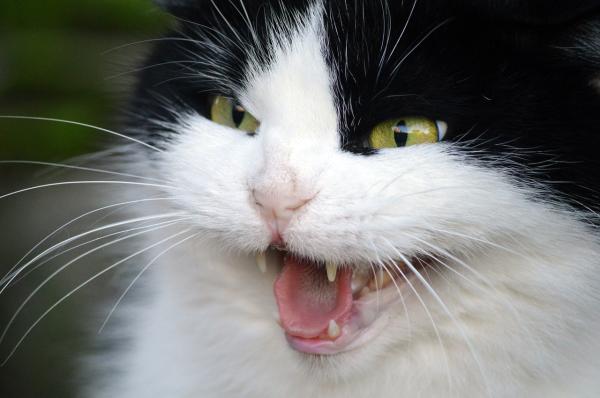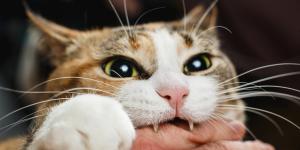My Cat Peed on Me - Why and What to Do



See files for Cats
When we adopt a cat into our home, we will need to expect a certain amount of disruption. Our couch arms will become scratching posts, anything not glued down is at risk of a swipe and we are likely going to find hairs in places we didn't know could get hairs. When they are being litter trained, we can also expect them to urinate almost anywhere including on ourselves. However, once a cat has been adequately litter trained, they should not urinate outside of their litter box. If they do, it is a clear sign of a problem, whether physiological or psychological.
At AnimalWised, we look at the reasons why my cat peed on me. We understand the causes of this behavior, what you can do to stop it and also how we can prevent improper urination in cats.
Pathological causes
Any change in a cat's behavior is a warning sign not to be ignored by their guardians. While kittens will urinate relatively indiscriminately, once they have developed and received litter training they will want to keep to a routine. Doing so will allow they to maintain a sense of security as disruptions can lead to a loss of their resources. Such resources include food, toys, safe spaces and even access to their guardians.
When a cat's routine is upset, they can develop various behavioral problems. This includes peeing on us or in other inappropriate places. However, the first thing we need to consider when your cat pees on you is their physical health. Incontinence in cats is when they lose the ability to control their bladder. This could be due to the following pathological causes:
- Urinary tract infections: one of the most common reasons a cat will pee on you is an infection of the urinary tract. When the lower urinary tract is affected, it is known as feline lower urinary tract disease (FLUTD). This is a group of conditions which can be either obstructive or non-obstructive. A common issue is bladder inflammation known as cystitis. When the bladder is inflamed, it can make urination difficult and they will often pee whenever they can, even if this means sitting on your lap.
- Urinary stones: various mineral deposits can accumulate in your cat's urinary tract. Sometimes they form in the bladder, but whenever they are sufficiently large, they will block the passage of urine. This can lead to an inability to control, their bladder. Learn more with our article on crystals in a cat's urine.
- Trauma: if a cat has sustained abdominal trauma, it may result in the genitourinary system functioning correctly. It can cause inflammation of the bladder or even affect the nerves around the bladder which make it difficult to control. If they receive head trauma, the problem can be cerebral and affect their brain's ability to send the right signals for urination at the right time.
- Tumors: if there is a growth on or around the genitourinary system, it can put pressure on the ducts and tubes which allow for urine to flow. This can lead to incontinence. Such tumors can be malign or benign.
There are other physical reasons why a cat will pee on me, but not all are well understood. If you see symptoms such a urine in the cat's blood, it is a sure sign of a pathological cause of incontinence. Even if you do not see any obvious signs of disease, we need to take the cat to a veterinarian to rule out the possibility.
Marking behavior
Cats nark their territory in various ways. When your cat rubs their face against you or even when they walk through your legs, they are leaving. They do so thanks to glands in their skin which are located on certain parts of their body such as their cheeks and their flanks. However, their most potent from of marking is with urine. Urine contains pheromones and other chemical signals which can provide a lot of information.
There are various reasons cats mark territory. It is both to inform others and themselves of information. These include:
- Marking their social group: when a cat butts heads against you it is not only a sign of affection, but it is their way of marking you as one of the family. They will do it to other animals or anyone they deem a friendly figure.
- Mark territory: one of the most important reasons for wild cats marking is to delineate territory. It allows them to know when they are in a safe space, but also alerts other cats and animals not to mess with them.
- Reproductive behavior: female cats will spray more in heat as a way to attract a possible mate for copulation. This is because males in the area do not go into heat, but will become interested when they smell the pheromones of a cat willing to reproduce. Males will also spray to let females know they are around and ready.
Cats will mark with urine and they can do so excessively when they are in heat. The same applies to males who are sexually active. We expect neutering male and female cats to stop this type of marking behavior. This is because removal of the reproductive organs stops the sex drive and the cats will no longer need to alert the opposite sex of their whereabouts.
For this reason, we recommend neutering your cat. Not only will it prevent marking behavior, but neutering has many benefits for the health of your feline. It will also stop the cat from trying to escape to copulate so it reduces the risk of them becoming lost.
In rare cases, we may find a neutering cat continues to spray which may result in them peeing on you. In these cases, there may be have been an issue with the neutering procedure or there may be some other issue at fault. Take a look at our article on why my neutered cat is spraying everywhere to learn more.

Does my cat mark me with urine?
As stated above, our cat will want to rub their scent on us to mark us as one of the family. They do so my rubbing their face against you and even when kneading with their paws. Although cats use spray marking to delineate territory, they rarely do it on a person. Spray marking is usually perform on a vertical surface and outside their immediate home.
When a cat does pee on you, it can be a form of marking. This will rarely happen if the cat is happy and healthy. However, if they feel like their security is threatened, it may lead them to pee on you as a desperate act. This can be seen commonly when there is a disturbance in their household and routine. Such disturbances include;
- Moving to a new home
- Renovation of the home
- Introduction of a new cat
- Introduction of pet of another species
- Arrival of a baby or new human family member
In these cases, the cat will often feel as if their place in the social order is threatened. If their social rank is threatened, they can feel as if they will lose their safety and resources. Peeing on you in this context is a way for them to more forcibly mark you as a way to better ensure their security.
What to do if a cat marks you with urine
Often a cat peeing on you due to the above situations will resolve on its own in time. This is because the cat will eventually see there is no real threat and their resources remain secure. However, there are important ways we can help the cat during this process.
One of the most important is socialization. If a cat is poorly socialized when they are young, it can lead to various problems. This is especially so when interacting with others. A poorly socialized cat is more likely to pee on you than a cat with a healthy understanding of others.
We will need to use positive reinforcement to associate the new situation with positive stimuli. This includes giving treats, using reassuring voices and even simply spending time with them. We should never scold or hit them when they pee on us as it will only make this process even more difficult.
Although we can address the problem of a cat peeing on us after the fact, prevention is always best. For this reason, we need to be prepared when there are changes to their home routine. Take a look at our article on how to introduce a new cat to a home to learn more.

Stress
The above situations are stressful for a cat as they threaten their security. They can cause the cat to actively mark us with pee as a way of combatting them. However, it is also possible that a cat is not marking, but the stress has resulting in general urinary incontinence.
When a cat is sufficiently stressed, their behavior will change in many ways. Eventually, it will likely harm their health and wellbeing. It will also cause problems such as destructive behavior or urinating (or even defecating) outside their litter box. Some of the common situations which cause stress in cats include:
- Changes in the home
- Poor socialization
- Emotional trauma
- Lack of routine
- Inappropriate diet
- Hectic homelife
- Physical health problems
- Neglect
These are only some of the reasons why a cat may be stressed. It is very important we pay attention to the individual needs of our cat. If we are not meeting these needs, it will result in them becoming stressed. For example, some cats may need more attention than others. If we are unsure of the reason why our cat is stressed, we will need to take them to a veterinarian. They will asses their physical health and may recommend we speak to a feline ethologist to make an assessment and recommendations.
If you want to read similar articles to My Cat Peed on Me - Why and What to Do, we recommend you visit our Behavioral problems category.






